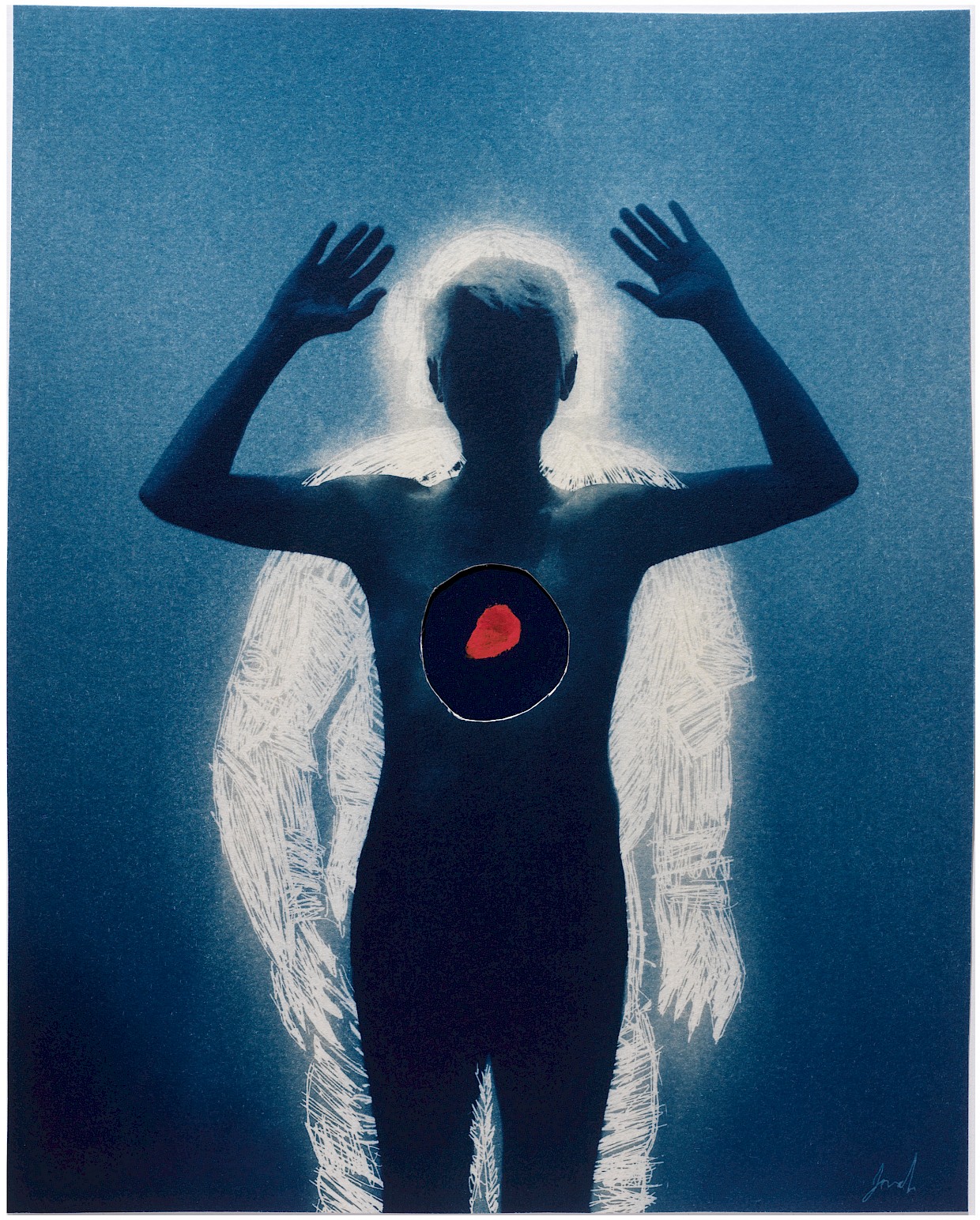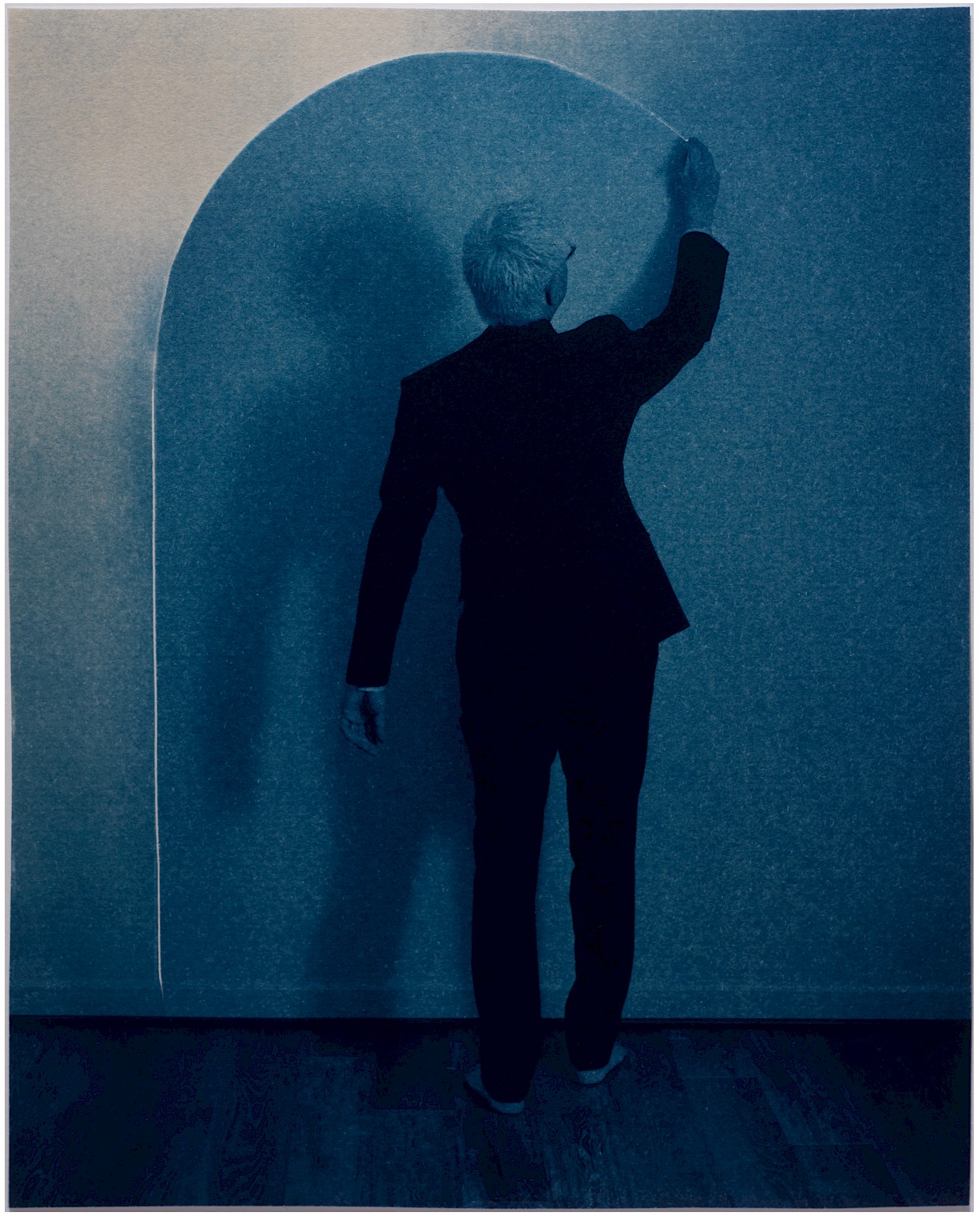What to do about Carl Jung's Shadow in the World Today
Jun 12, 2020 / The Twelve Mysteries / carl jung

The Hearts of Men. Cyanotype Collage with Gouache & Drawing, 2020. Two Sizes available. © Jonah Calinawan
To be honest, I don’t know whether to be angry or sad these days.
I’m part of the silent many who support movements that address the “-isms” and “-phobias” that plague our society: racism, sexism, ageism, homophobia, xenophobia, and the list goes on. Saying nothing about George Floyd’s murder doesn’t feel right. But saying something feels inadequate also. My hope is that the protests in the US and around the world will help eradicate two viruses when this pandemic is over.
Racism is also a virus. And, it’s even worse than coronavirus. This virus is airborne and transmissible through words, images, and inaction. Just like asymptomatic COVID carriers, people infected with racism don’t know they’re infected. This virus doesn’t live in the bloodstream where an antibody test can detect it. Instead, it lives in a person’s shadow.
The Jungian Shadow Archetype
Swiss psychiatrist Carl Gustav Jung in the beginning of the 20th century coined “shadow” to refer to repressed aspects of a personality that are considered shameful, ugly, and dangerous. It includes emotions and tendencies like worthlessness, addiction, jealousy, greed, prejudice, hate, and aggression.
Because of societal pressure, a person with racist thoughts will pretend it’s not there. The longer a person refuses to acknowledge this, the more these feelings and ideas are pushed down into the unconscious and into the shadow. The shadow becomes a blind spot to the point that, given the right stimuli, it explodes and overtakes reason without the person even being aware of it. How else do you explain a man pressing his knee on George Floyd’s neck for almost 9 minutes while the other three police officers stood by and watched? How else do you explain a woman calling the police and pretending that Chris Cooper was threatening her when she was being recorded on video? How else do you explain two men (who weren’t even police) chasing Ahmaud Arbery as he was jogging and then shooting him to death while another man filmed it?
A gentle and reasonable being can be transformed into a maniac or a savage beast. One is always inclined to lay the blame on external circumstances, but nothing could explode in us if it had not been there. As a matter of fact, we are constantly living on the edge of a volcano, and there is, so far as we know, no way of protecting ourselves from a possible outburst that will destroy everybody within reach. It is certainly a good thing to preach reason and common sense, but what if you have a lunatic asylum for an audience or a crowd in a collective frenzy? There is not much difference between them because the madman and the mob are both moved by impersonal, overwhelming forces.
Is a World Without Shadow Possible?
With the potential destructiveness of the shadow, it is tempting to imagine a world where people do not carry around a shadow.
Based on what I’m learning and reading, you can’t eliminate the shadow. It’s the yin and yang duality of the Self. The whole Self, according to Jung, is the union of the consciousness and unconscious parts of a person.
The way I think about the shadow uses the art idea of contrast. How can you illustrate that a surface is smooth? The answer: you juxtapose it with something that is rough. To show something is bright, you place it with something dark. In other words, light cannot exist without darkness. You can’t have one without the other.
Can You Negotiate with The Shadow?
If you can’t eliminate your shadow, what can you do instead? This quote suggests a way forward:
If we are able to see our own shadow and can bear knowing about it, then a small part of the problem has already been solved: we have at least brought up the personal unconscious. The shadow is a living part of the personality and therefore wants to live with it in some form. It cannot be argued out of existence or rationalized into harmlessness. This problem is exceedingly difficult, because it not only challenges the whole man, but reminds him at the same time of his helplessness and ineffectuality.
But wait, how do you see your own shadow if it’s unconscious in the first place? This brings us to another concept that I’m learning about.

The Portal. cyanotype on paper, 2020. Two print sizes. © Jonah Calinawan
Projection as a Way to See The Shadow
Like a movie projector that projects a film image onto a theater screen, your shadow will project its hidden contents onto a person, a group of people, an institution, or even a country—anything “other” than you. Here’s an example from my own experience.
A Personal Example of Shadow at Work
I had an irrational and automatic dislike for someone at work. He was confident and spoke his mind at meetings. He was conceited, self-centered, and had a big ego. No matter how hard I tried, I couldn’t stand him, so I avoided working with him for years.
Recently, I realized that I was the one who was conceited and self-centered. I couldn’t admit that to myself and so I repressed it. Jung says that the shadow is a living part of the personality and therefore wants to live with it in some form.
What did my shadow do? It projected these undesirable characteristics onto someone else. The only reason I learned this was because a psychologist friend suggested it after I recounted yet another episode where this guy was a total jerk. My friend then said, “Sounds like you’re projecting. You’re pointing out your own insecurities as flaws of another person.” What? After much soul-searching, I decided she was right. It really didn’t make sense that I would dislike this person as he had done nothing to me!
Racism & Projection
Could it work the same way with racism? Could an irrational and impulsive dislike of a black person or a person of color be a projection? Especially if the person has done nothing to you?
I want to be honest: I don’t know the answer. And, I don’t think anyone else does either. Nobody has invented a vaccine for racism. But clearly, a self-serving and automatic statement “but I’m not racist” does not work. It’s a “slogan of denial” says Ibram Kendi, author of How To Be An Antiracist (affiliate link). The New York Magazine recently posted antiracist books attempting to illuminate this problem. These books might be helpful.
Self-reflection and self-examination have to be part of the solution—a process that Jung calls “shadow work.” Writing in your journal might also help. The goal is to integrate the shadow and make peace with it by recognizing one’s projections for what they really are.
If you imagine someone who is brave enough to withdraw all his projections, then you get an individual who is conscious of a pretty thick shadow. Such a man has saddled himself with new problems and conflicts. He has become a serious problem to himself, as he is now unable to say that they do this or that, they are wrong, and they must be fought against… Such a man knows that whatever is wrong in the world is in himself, and if he only learns to deal with his own shadow he has done something real for the world. He has succeeded in shouldering at least an infinitesimal part of the gigantic, unsolved social problems of our day.
By Saving Yourself, You Save the Entire World
I’m beginning to see a recurring thread of advice on how one might live a meaningful life: you have to start with one’s self.
In The One Deep Question to Ask Yourself Before the Pandemic Ends, Dr. Clarissa Pinkola Estés and Joseph Campbell suggest that by saving yourself, you save the entire world.
Carl Jung in his words above essentially says the same thing. A man who deals with his own shadow has done something real for the world. He has succeeded in shouldering at least an infinitesimal part of the gigantic, unsolved social problems of our day.
This familiar refrain must mean something, don’t you think?
By addressing your shadow, you save yourself, and thus the entire world.



